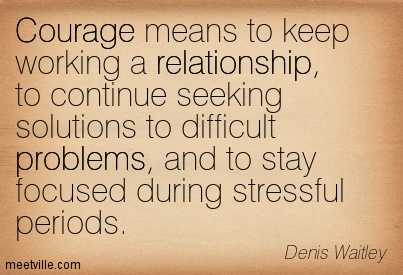Step parenting is hard enough, but when your relationship is difficult even without the kids, it is really tough. Here are some things you can do that will help you deal with a difficult relationship:
 Identify the problem. It is crucial you figure out what you are dealing with. Is it alcoholism, drugs, past relationship issues, borderline personality disorder, depression, anxiety, low self-esteem, distrust, insecurity, narcissism or just plain dysfunctional dynamics? Identifying the problem helps you make sense of what is going on.
Identify the problem. It is crucial you figure out what you are dealing with. Is it alcoholism, drugs, past relationship issues, borderline personality disorder, depression, anxiety, low self-esteem, distrust, insecurity, narcissism or just plain dysfunctional dynamics? Identifying the problem helps you make sense of what is going on.
Get Support. You may not be used to reaching out to other people for help, but you need to. Whether it is a trusted friend or family member, a counselor, a 12 Step group, or support group, reaching out will give you ideas on how to react in a different way.
Change Yourself, Not Her. Even though she needs to make changes, it won’t work for you to try to force her to change. You are
Detach with Love. Detachment is about healthy separation. Even though you are in a relationship, you are a separate person. You don’t have to take on her blame, moods, opinions, anger, crises and threats. You can let her be who she is without feeling like it is your fault, your responsibility or your problem. You do this while continuing to care and treating her kindly.
Take Care of Yourself. No matter how tough things get, you have to take good care of you. Don’t neglect your physical, social, mental, spiritual and emotional needs. Make sure you meet all of those needs in a healthy way.
Speak the Truth. You need to speak your truth even if she doesn’t listen. You decide what you need to say for you. It isn’t necessarily to make her agree with you or admit that what you say is true. It is because you need to say it. Make sure you speak in respectful “I statements” that own your opinions and feelings as yours. An example is: “I am struggling with our relationship. I don’t like being criticized so much.”
Set Boundaries. A boundary is about what you are willing and not willing to do. Look at your relationship. Decide what is and isn’t acceptable. Get clarity about what you can live with and cannot live with. And remember, a boundary isn’t about telling her what she can and cannot do. You can tell her what your limits are and let her decide if she is willing or not willing to make changes to live with the conditions you are setting for yourself.
These things will give you concrete ways of handling the problems that come up on a regular basis. Your relationship may continue to be difficult, but you won’t feel so overwhelmed and frustrated when you have specific things you can do.
Karla is a frequent contributor to Support for Stepdads. Please check out some of previous articles:
Is He Right For You and Your Children
Depression – Fighting the Holiday Blues
Help For Children Dealing with a Difficult Stepparent








